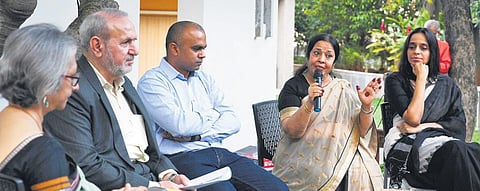The evolution of experiencing books in the digital age
HYDERABAD: Reimagining how we create and consume a book has never been more significant than in present times when a book is available not only for reading but also for listening, watching and experiencing.
Shedding light on some pertinent questions such as what importance a physical book holds in the age of the digital revolution, how the process of writing and reading has changed with technology and how one can preserve the material documents available for future generations, the organising committee of Hyderabad Literary Festival (HLF) held a panel discussion on “The Many Lives of a Book: Reimagining Books in the Digital Age” at Saptaparni here on Saturday.
The panellists included Zareena Parveen, director, of Telangana State Archives & Research Institute, Hyderabad; Ali Niroomand, regional director, Noor Microfilm International Centre (NMIC), New Delhi; Hari Ram, author and management consultant; and Vinoo Alluri, assistant professor, Cognitive Science Lab, IIIT-Hyderabad. The discussion was moderated by Usha Raman, professor of Media Studies, University of Hyderabad.
While Ram presented a neurological perspective of enhancing the reading experience, Alluri offered a cognitive perspective.
Speaking about the archival process in an age where both fetishisation of a physical book and its discarding takes place simultaneously, Zareena Parveen said, “Humans are bad at handling physical books, which need as much care as an ailing human body. The idea of preservation does not include digitisation only, the material book also needs to be preserved. We have developed ‘herbal’ ways of conservation, which include the usage of natural and harmless materials.”
Explaining the Memorandum of Understanding (MoU) signed by the State government with Iran government-backed NMIC to restore and preserve Urdu and Persian historical documents, Zareena Parveen said the Telangana government has provided a yearly budget of `1 crore for digitisation and archiving of rare ancient manuscripts.
She mentioned that the State archives hold around 43 million records including about 772 manuscripts dating back to 7th century BC. “The script used for writing these documents is very difficult to read. Even experts in the field have difficulty deciphering the cursive style of writing. Therefore, restoration and preservation is a fundamental and laborious work,” she said.
Commenting on the same, Ali Niroomand said, “If someone needs to know the history of the Deccan region, knowledge of old Persian scripts is very important since it was the language of the court until 1885.”
He added that the preservation method that they are using currently will ensure that a text lasts for about 200 years.
Emphasising how the experience of reading a book has changed over the years, Hari Ram said that AI-driven technology will bring promising changes in keeping ideas alive and presenting them in customised forms.
“Scientists are surely having a lot of fun with AI entering the picture but nothing can replace the experience of reading a physical book. We can surely enhance the experience of it by adding music and visual aids, which is not a new concept,” said Vinoo Alluri, who is currently researching on how music changes the experience of reading a book.

